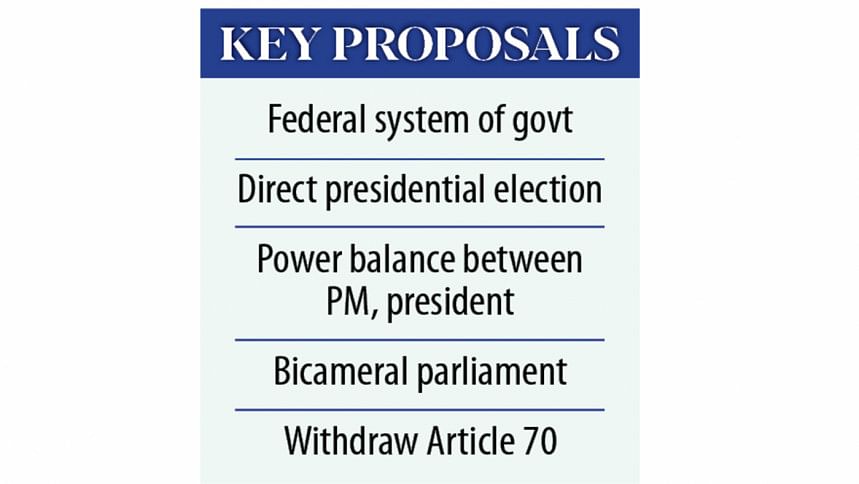Decentralise power, adopt provincial govt system

Leaders of various professional organisations, young intellectuals, and cultural activists yesterday proposed introducing a federal system of government and amending the constitution through consensus among political parties.
The proposed federal system of government would decentralise power by introducing provincial governments, unlike the current unitary system in Bangladesh, where power is concentrated in the central government.
This change aims to ensure equitable regional development and greater autonomy for local governance, they added.
At a meeting with the constitution reform commission in the cabinet room of the national parliament building, they also suggested a direct election for the president and a balance of power between the president and the prime minister.
Currently, Bangladesh follows a parliamentary system where the premier holds executive power, and the president, elected indirectly by parliament, serves as a largely ceremonial head of state.
Speakers also proposed a provision in the constitution requiring political parties to nominate 25-30 percent women in national polls, scrapping the existing system of reserved seats for women. Other proposals included the restoration of the caretaker government system and the introduction of referendums for making critical government decisions.
"We proposed establishing a separate secretariat for the judiciary as part of ensuring full independence of the judiciary," said Mahbub Uddin Khokon, president of the Supreme Court Bar Association.
He emphasised the need for consensus and commitment among political parties to pass constitutional amendments in parliament once they come in power after an election. Additionally, he advocated for provincial governments to ensure the development of all regions of the country.
Kader Gani Chowdhury, secretary general of the Bangladesh Federal Union of Journalists, suggested establishing a bicameral parliament to eliminate the risk of one-person rule in the future.
He also proposed withdrawing Article 70 from the constitution and incorporating provisions for referendums and an ombudsman.
A bicameral parliament would consist of two separate chambers, typically a lower and an upper house, to provide a more balanced representation and prevent the concentration of power in one body, whereas Bangladesh currently has a unicameral parliament with a single house, the Jatiya Sangsad.
Meanwhile, Article 70 of the current constitution prevents members of parliament from voting against their party's position, effectively limiting their independence; the proposal to withdraw it would allow greater freedom for MPs to vote according to their conscience.
Adil Mohammed Khan, president of the Bangladesh Institute of Planners, also endorsed the use of referendums, arguing that major divisive decisions, such as the construction of the Rampal power plant, should be decided through a vote by the people.
He further suggested that the term "founding fathers" could be adopted in the constitution instead of the "Father of the Nation" concept to recognise and honour the contributions of other significant figures in the Liberation War.
Representatives from different professional organisations also shared their views on constitutional reforms. They included Nasrin Begum, chairperson of the Arbitration Tribunal of the Federation of Bangladesh Chambers of Commerce and Industry; Kabir Hossain, convener of the Interim Central Convening Committee of the Institution of Diploma Engineers; Anjan Das, vice president of Bangladesh Garments Sramik Sanghati; Chowdhury Ashiqul Alam, president of Bangladesh Trade Union Sangha; and Nirupa Dewan, a member of the CHT Nagorik Committee.
The commission chair, Professor Ali Riaz, presided over the meeting, which was attended by commission members including Professor Sumaiya Khair, Barrister Imran Siddiq, Professor Mohammad Ikramul Haque, Sharif Bhuiyan, Barrister M Moin Alam Firozi, Firoz Ahmed, and Md Mustain Billah.
This was the fifth such discussion held by the commission.

 For all latest news, follow The Daily Star's Google News channel.
For all latest news, follow The Daily Star's Google News channel. 



Comments